This weekend, I had the pleasure of attending Champaign-Urbana’s 10th Annual Pridefest celebration, and as a Parkland College student, I marched with Parkland Pride this year. The parade was longer than ever, with over 70 floats, and the streetside teemed with people cheering and screaming, all in support of the LGBTQ community. I was moved to tears multiple times by cheers, signs, hugs from friends, and respected people in the city. It was so freeing to march, hand-in-hand with loved ones, unafraid of judgment.
All around us, people of every age and background wore t-shirts proclaiming “Love is Love” and “No H8” or, my personal favorite, “You can kiss whoever the fuck you want.” High school gay-straight alliances and politicians and businesses with booths, and kids wearing various pride flags as capes were everywhere.
It was bittersweet for me. As a teenager, I was always so careful not to be too open about myself. The late ’90s were a different world from the one in which we now live, and the idea of marching in a Pride parade would have terrified me. I think a lot of things in my life would have been different if there had been Pridefest in the heart of downstate Illinois. If the LGBTQ community had felt as safe then as it does now, maybe I would not still be reeling from the fear that plagued my high school years. And yet, feeling safe is a fleeting thing.
I’ve talked before about the fear LGBTQ people face day-to-day, especially in today’s society. As we wandered around the festival, and around downtown Champaign after the parade, even as I felt free, I became acutely aware of how often I mentally did a safety check. Each time, I breathed a sigh of relief as I remembered, it’s Pridefest. Who’s going to say something? If they do, they’ll be quickly shut down. But that’s just it. Every day is not Pridefest. Most of the time, I avoid any public display of affection, out of a sense of self-preservation. I never know who might be watching, or what could happen, and something as innocent and innocuous as holding my husband’s hand in public leaves me feeling exposed. It leaves us vulnerable.
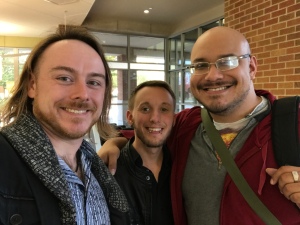
- Myself, Aiden, and Michael, the day after Aiden & I got married
I felt vulnerable for new reasons at this Pridefest, too. My husband and I practice what is termed consensual nonmonogamy or, more commonly, polyamory. We don’t ascribe to the belief that there is–nor that there must be–only one person with whom you share your life. And, while you may be more familiar with terms like open marriage, or swinging, polyamory is not the same thing, though they are at their core all variations on a theme. We are married and deeply committed to one another; we also date other people, both together and separately. We have a boyfriend, and he came to town to spend Pridefest with us. My husband’s other boyfriend, who is also a close friend of mine, lives in Texas, and we only see him once or twice a year right now.
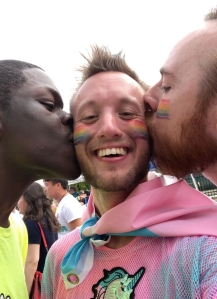
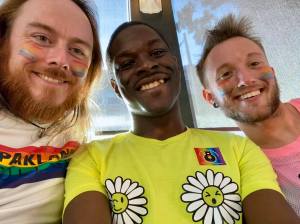
I have never talked openly about this, and walking around downtown, holding hands with my husband and my boyfriend, being visible for who I am and facing no judgment for it, was an eye-opening experience. As the day of the festival was coming to a close, reality set in that the next day we would be back to business as usual. Caution and fear of judgment would replace all the openness and safety we felt.
And yet, why is judgment so frightening? I spent my youth being assured that it’s okay to be different, even though the social pressures said otherwise. When I came out as gay, I was cautioned to “be a Will [Truman], not a Jack [McFarland],” meaning just to be myself, and not be over-the-top with my gayness, or to make it the cornerstone of my persona. Moreover, it was a warning to play it safe because the world can be a cruel place. This advice was sound, but as I grow older, it chafes me. I’ve played it safe for so much of my life, afraid of the cruelty of others, that I cringe internally at holding my own husband’s hand. When speaking with a guest at work, if a personal anecdote fits the situation, I carefully weigh whether I should say “husband” or “other half.” I debate whether I should tip my hand by saying “he” or if I should carefully construct the sentence in such a way that no pronouns are necessary.
It shouldn’t matter, but it does. The reality is that, in the current social and political climate, being open about being non-heterosexual or non-monogamous is still dangerous. Perhaps less so in Champaign-Urbana than in other places, but it is still a reality that someone could hurt or even kill us for who we are.
But then, if someone doesn’t approve of my life, when nothing I am doing causes harm to anyone, why is their opinion one that matters? Well, according to Brené Brown, a Ph.D. and LMSW who has spent decades researching shame, courage, and vulnerability, it’s because “we are neurobiologically hard-wired to care what people think.” And it’s true, no matter how much you may tell yourself you don’t give a shit, it is unavoidable that deep down, you do. The harshest thing I’ve dealt with most of my life is disapproval—sometimes stern, and sometimes from the people closest to me.
In the closing remarks to her Netflix special, The Call to Courage, Brené says something that truly resonated with me:
“Vulnerability is hard, and it’s scary, and it feels dangerous. But it’s not as hard, scary, or dangerous as getting to the end of our lives and having to ask ourselves, ‘What if I would have shown up? What if I would have said I love you? What if I would have come off the blocks?’ Show up, be seen, answer the call to courage, and come off the blocks. Because you’re worth it. You’re worth being brave.”
I’ve never considered myself a brave person. My previous blog was written under the pseudonym of Kieran Roy to maintain some level of anonymity. I had two blogs, one for general topics, and one for my spirituality, again out of fear of sideways glances. When the weekend was over, and Malcolm and Aiden started posting pictures of the three of us together on Facebook and proclaiming “boyfriends” my heart skipped a beat, and not in a pleasant way. I was exposed again, and this time it was outside of the safe space of Pridefest. What will my boss think? My co-workers, my friends, my brother? Oh, gods, what about my parents? A lot of conversations haven’t happened yet. Some of the conversations I’ve already had about Aiden and Michael—his Texan boyfriend—have been less than pleasant at best, and downright uncomfortable at worst. But, hiding from those conversations doesn’t change anything, and it certainly doesn’t make them less necessary.
How can I say I have pride in who I am if I am not also brave enough to talk about it? Being open and honest about who I am at my core is the only thing that can make a difference between having to hide in the shadows, or being able to stand in the light of day. Those high school gay-straight alliance tables at Pridefest were built on the backs of those who dared to say, “I am here.”
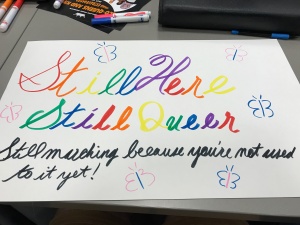
I don’t know what consequences may or may not come from sharing this. I don’t know if it will come back to haunt me years from now when I am finished with my Master’s Degree and moving into my first job search. But, I know what comes from keeping silent or trying to hide things that are at the core of who I am, and that is shame. I refuse to continue to be quiet and ashamed.
My name is Daniel Sheff. I am pansexual, polyamorous, and pagan. Those things are true, whether I talk about them or not, so it seems to me that talking about them is easier. I am proud of who I am, and if I act like it, maybe other people can be, too.
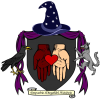

Wow. What a powerful piece. Very moving. Love you Scooter.
LikeLike
Proud of you. You are loved.
LikeLike
Awesome
LikeLike